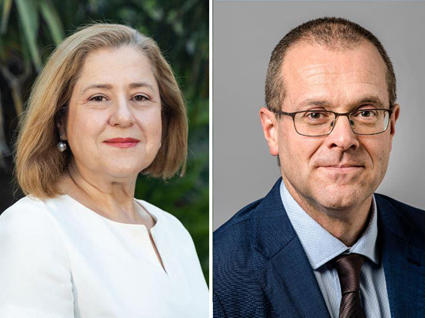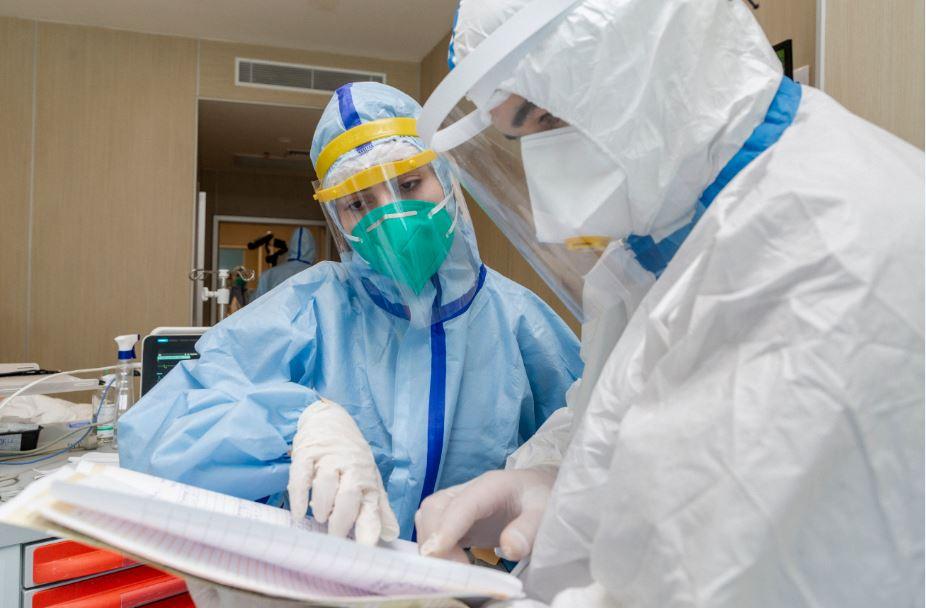2020: The year we understood the true value of health

Dr Hande Harmanci, WHO Representative in Azerbaijan, and Dr Hans Henri P. Kluge, WHO Regional Director for Europe.
The COVID-19 pandemic has shaken the world and brought many countries to a standstill. The virus has swept through our nations, communities and lives, exploiting gaps in our emergency preparedness, weaknesses in our health systems and inequalities in our societies. It is a human tragedy and a global crisis. As we have stepped into 2021, we look back to 2020 what have we learned, what have we achieved, and what hope is on the horizon?
A Year in Review: Lessons learned
Experience has now shown us that health is at the centre of development, a determinant of individual and collective growth. At every step of life’s journey, we need targeted, tailored support to promote our health and well-being. Attending school is precious for a child’s social development; providing a social safety net is vital when jobs are threatened; creating supportive environments and quality care offers older people the dignity they deserve.
Responding to the pandemic has required action beyond treating the virus. Insights into human behaviour and cultural norms have been critical to tackle COVID fatigue and misinformation campaigns spread through social media. We have learnt that we needed to engage communities more effectively to be part of the solutions. And that only when measures are scientifically sound and culturally acceptable will they be effective.
To meet varied and complex needs, health systems have had to adjust with unprecedented speed. They established dual track service delivery where essential services were provided in parallel to services focused on pandemic response. Digital solutions have contributed to bridging service gaps when face-to-face services were impossible. These innovations will be crucial to catch-up for missed heart disease, diabetes, hypertension, cancer and other disease-specific services, and to accommodate growing mental health needs.
Science and research have been indispensable in shaping our response – from developing diagnostics, exploring treatment and producing vaccines at unprecedented speed. Old and new technologies have been used to establish the evidence for public health and social measures.
Our health and care workers are cherished professionals, who deserve our unwavering respect and gratitude. They also require adequate social, mental, physical and financial support, to ensure their health and well-being, and to guarantee sustainable, functioning health systems during the pandemic response and beyond. Frontline workers – teachers, social, community and postal workers, bus drivers, grocery and supermarket staff, and many others – who before were invisible and undervalued, have kept our societies running.
We have seen inspiring examples of community solidarity, human ingenuity, collective and individual compassion in every corner of the Region. People have remarkable resilience, optimism and generosity and Azerbaijan was no exception.
The WHO Country Office in Azerbaijan has been at the epicentre of the COVID-19 response in the country since the beginning, supporting various ministries, government partners, agencies, and NGOs. We have also been one of the major sources of information for the UN at large, the diplomatic community and international partners.
WHO was one of the “early responders” in the country, bringing in international technical expertise, physically and virtually, to prepare the health system for the upcoming surge. The REACT-C19 project, which started in April 2020, was a quick response to help prepare hospitals for the pandemic. At that time, when there were 6 COVID designated hospitals in the country, REACT-C19 teams worked in 12 hospitals over a period of 3 months to improve their readiness to accept COVID patients, as well as create a safe environment for health care workers and patients. REACT-C19 has left a legacy, the PROACT Project, which aims to support the creation of sustainable systems to improve the essential competencies of health care workers and to deliver essential health services to those who are left behind because of COVID-19.
In addition to technical assistance, Azerbaijan has also received WHO laboratory testing kits, large numbers of personal protective equipment, and hospital equipment from WHO to improve the management of COVID-19 patients. We are grateful to have collaborated with the main development partners in the country, the European Union and USAID, to provide both technical assistance in Azerbaijan as well as life-saving devices and goods.
The recent hostilities in and around the Nagorno-Karabakh region significantly stretched the health system, which was already under stress due to the pandemic. Numbers of new cases and deaths increased rapidly during the time. This had a knock-on negative impact on the provision of essential health services such as vaccinations, control of some chronic diseases, etc. Findings from a WHO-organized health needs assessment mission in Ganja, Berde, Terter and Agdam highlighted areas for further collaboration and where health services should be strengthened. We will be honoured to support with the Government of Azerbaijan in these areas and beyond.
Furthermore, we were extremely proud when Azerbaijan allocated a total of $10 million to the WHO central COVID fund to fight the pandemic, showing solidarity with the global community. This has given the WHO Country Office in Azerbaijan a boost and encourages us to do even better for the health of the country.
The year 2020 has shown us that health is not only an individual concern, but it requires collective effort.
2021 and beyond: leaving no-one behind
We all have a role to play to shape the future we need. This can only be achieved by placing health and equity at the heart of all policies. WHO/Europe’s health strategy “United Action for Better Health”, is built upon what citizens expect from their health authorities in order to thrive in healthy communities. For this, we need to guarantee people’s right to universal access to quality care, accelerate action to reduce health inequities and strengthen public health leadership at local, regional, national and international levels. This is an ambitious agenda but one we can achieve together. People increasingly – and rightly – hold their health authorities to account for meeting these expectations and to “leave no-one behind.”
In the wake of COVID-19, it is clear that building strong, sustainable, equitable and responsive health systems is in everybody’s interest. Health is fundamental to ensure both economic development and social cohesion.
There is a wider context to health – from how we produce our food, the way we live in urban settings, the factors that make communities resilient, to what areas our financial systems invest in, and the value we place on those who provide essential services. The pandemic has forced us recognize and reassess these issues.
To lead us in a new direction, WHO/Europe has brought together expert and political voices. The Pan-European Commission on Health and Sustainable Development comprises experts from a range of fields including former heads of state and government, distinguished life scientists and economists, heads of health and social care institutions, and leaders of the business community and financial institutions. The Commission is looking forwards, through the impact of the pandemic, to changes that are needed in society, with a view to elevating health to the top of the political agenda. It will offer guidance on how to invest in health, health systems and social care systems for the benefit of all sectors.
2020 has taught us that health is not something we can take for granted, and healthcare is only truly effective and protective if everyone has access. If we want to protect ourselves from future crises, we must leave no one behind.
In brief
In 2020 COVID-19 upturned everything that we thought was normal.
It was a year that has tested everyone.
Let us remember 2020 through the acts of courage, optimism and generosity by frontline workers everywhere.
Let us meet 2021 with optimism and hope driven by the knowledge that our response is scientifically driven and has strong community engagement.
Here we are to serve you with news right now. It does not cost much, but worth your attention.
Choose to support open, independent, quality journalism and subscribe on a monthly basis.
By subscribing to our online newspaper, you can have full digital access to all news, analysis, and much more.
You can also follow AzerNEWS on Twitter @AzerNewsAz or Facebook @AzerNewsNewspaper
Thank you!

